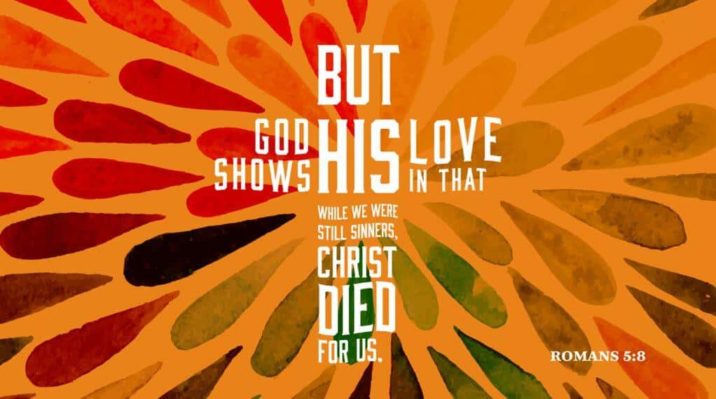As Paul highlights the contrast between Adam and Jesus in Romans 5, he communicates powerful truths about sin.
In Confronted by Grace: Meditations of a Theologian, Professor John Webster draws out three ways to define sin using Romans 5, all of which are needed to fully grasp its significance.
Sin is original
“Original sin” isn’t a means for us to point fingers at Adam and Eve and absolve ourselves of wrong-doing. It’s the fatal flaw every human possesses from the moment we exist.
“Original sin isn’t something we invent each time we do it,” Webster says. “It’s already there, within us, deep in the structure of human life—in ourselves, and in humanity as a whole.”
Sin is often compared to a disease that everyone has. People can show different symptoms for the same disease—some people may even appear to be quite healthy—but those symptoms are not the disease, and whether or not you have the disease is not determined by what symptoms you show, how many symptoms you have, or how often you experience them.
There isn’t some terrible coming-of-age moment in everyone’s life where they enter into sin and thereby become sinners. We might have a moment where we suddenly become aware of our sinfulness after a shift in perspective or facing the consequences of our actions, but sin is always there—whether we recognize it or not.
“There is in each of us, and in human life and history collectively, a depravity, a warping of our natures against God, something so basic and radical in us that we not only commit sins, but truly are sinners to the depths,” Webster says. “Sin is original because it’s the inescapable condition of human life which has broken loose with God.”
In a conversation about original sin, especially with someone unfamiliar with sin, it might be easy for someone to think, “So this is all Adam’s fault?” Did we genetically inherit this fatal defect because Adam and Eve made a choice we all obviously wouldn’t have?
Webster says, “to talk about original sin is not to suggest that some distant ancestor Adam failed and we are mysteriously infected with his guilt and curse. Original sin isn’t a contagion or defect passed down through the generations of the human race until, finally, it reaches us and pollutes our lives also. If we talk that way, we all too easily make ourselves innocent: We’re not really guilty, but just polluted—victims of Adam and not Adam’s companions who willingly consent to Adam’s crime against God.”
Sin is deadly
At a conference I recently attended, the speaker shared a conversation he had with a friend on a road trip.
They were listening to the radio, and an uplifting ad ended with the line, “Life is better with God.” (When the speaker shared this tagline at the conference, people whooped and yelled “Amen!”) After hearing the ad a few times, his friend said, “I can’t stand hearing that!”
An uncomfortable silence fell between them while the speaker thought, I say things like that all the time.
His friend went on to say that the ad was perpetuating bad theology. “Life isn’t better with God. If you don’t have God, you don’t have life. Period.”
Jesus is the only one who gives us life (John 6:35, John 3:36, John 11:25–26, Acts 17:28). And that’s why sin is deadly—it lets us believe there’s an alternative.
As Webster puts it, “Sin brings death because sin destroys that dependence on God which alone gives life. . . . To live is to live in relation to God, to live in communion or fellowship with the one who is our beginning and our end. Life isn’t our possession, something we own. We’re alive as we receive life from God, as the gift of his grace and mercy.”
Sin is the rejection of God, and therefore, the rejection of life.
“We take ourselves out of God’s hands and place ourselves firmly in the hands of a ruthless and entirely successful killer,” Webster says. “Or, as Paul puts it, sin always pays its wages, and the wages of sin is death (Romans 6:23).”
Sin is tyrannical
“‘Death reigned’ (Romans 5:14); ‘death reigned through that one man’ (Romans 5:17); ‘sin reigned in death’ (Romans 5:21). . . . We hand ourselves over to the tyranny of sin freely and willingly, because we foolishly think that this is a slight price to pay for what we hope to gain by wriggling free of the will of God.”
We exchange the truth of God for a lie (Romans 1:25).
“Pretty soon, however, we find that what looked like open fields of liberty and fulfillment and mastery of our own fate are nothing of the sort. We find ourselves in a gray and cramped and rather frightening world, in the clutches of demons. We find ourselves trapped; we have been deceived into thinking that we are enhancing our lives when, in fact, we’re binding ourselves to compulsion and falsehood and fear. Seeking to become gods and lords apart from God’s gift of true life, we’ve become the bonded slaves of a lord who does not seek our good, and whose gift is not life but death.”
Why we need to understand sin
We don’t need to understand sin so we can wield it as a weapon, prodding people to Jesus with fear and self-loathing.
We need to understand sin to understand the significance of God’s grace.
“If we remind ourselves of all this, it’s not because we want to wallow in pathological self-accusation,” Webster says. “It’s because we need to face the truth. We aren’t happy innocents who have got a bit lost in the woods; we aren’t victims on whom truly sinful people trample. We’re children of darkness (Ephesians 5:8); and there is no health in us.”
But that’s not the whole story. And that’s not the heart of the gospel, even if that’s all some people see on a street preacher’s sign.
Repentance is part of a beautiful process of choosing life instead of death, and God’s love for us is the only reason we have that choice at all.
“This is the story of the great reversal of all that’s gone before: the overthrow of the order of sin and death, the casting down of the pretended lordship of evil, the setting up of the rule of righteousness. It’s the story of salvation—the story of what Paul calls the ‘free gift’ that’s antithetical to the ‘trespass’ (Romans 5:15), and identical with the name of one man, Jesus.”
Get Confronted by Grace: Meditations of a Theologian to keep exploring Christianity through the powerful, grace-focused preaching of Dr. John Webster.











